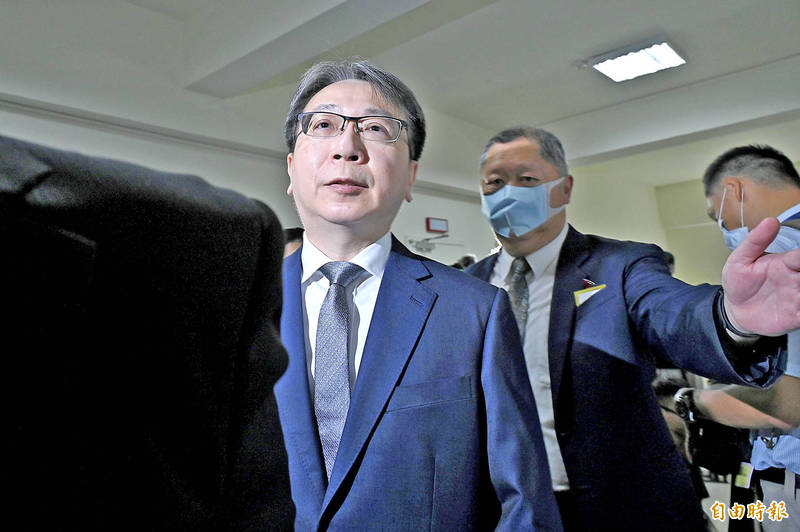《TAIPEI TIMES》China interrogating Taiwanese: official

National Security Bureau Director-General Tsai Ming-yen arrives to address the legislature’s Foreign and National Defense Committee yesterday in Taipei. Photo: Tu Chien-jung, Taipei Times
ELECTION THREATS: In the run-up to January’s elections, China might seek to use economic pressure, increased military incursions and strategic polling to sway voters
By Shelley Shan / Staff reporter
More Taiwanese are expected to be interrogated when entering and exiting China after Beijing began implementing its expanded Counter-Espionage Law, National Security Bureau Director-General Tsai Ming-yen (蔡明彥) told the legislature’s Foreign and National Defense Committee yesterday.
Legislators on the committee expressed concerns that more Taiwanese might be given a difficult time when entering China following the July 1 implementation of the law, which had been expanded from 40 articles to 70.
Previously, only four cases of Taiwanese being detained and questioned when entering and exiting China had been reported, but since July, nine Taiwanese have said they had been interrogated and had their smartphones and laptops inspected, Tsai said.
“Chinese immigration officers check whether the person has commented on political issues or said anything critical of the Chinese Communist Party [CCP] in their communications with others. Most of the Taiwanese who were interrogated were involved in politically active groups or were academic experts. Chinese who are married to a Taiwanese could be treated the same way,” he said.
The reasons they were selected for questioning vary, from their jobs in Taiwan to their previous remarks and activities, he said.
In most cases, Taiwanese were interrogated as soon as they entered China, but a recent case showed that they could be interrogated even after passing customs and checking into a hotel, Tsai said.
“It has come to our attention that China’s National People’s Congress is planning a series of amendments in the next three to four years, 40 percent of which would be focused on national security issues and reinforcing the rule of law,” he said.
Thirteen cases in which Taiwanese have been imprisoned after being incriminated have also been reported, he said.
Travelers to China need to be cautious and avoid actions that could incriminate themselves, Tsai said.
Separately, the CCP could conduct cognitive warfare against Taiwan in the run-up to the presidential and legislative elections in January, through the manipulation of controversial political issues, he said.
“The CCP could recruit Taiwanese polling firms to conduct surveys to sway public opinion in its favor. We are also watching whether it is using other means to affect the outcomes of the elections,” he said.
China could attempt to influence elections by intensifying military threats to amplify a sense of an imminent conflict in the Taiwan Strait, with the desire of making the elections appear to be a choice between war and peace, Tsai said.
The CCP could also seek to impose economic pressure on Taiwanese businesspeople in China, he said.
Beijing’s recent move to review its economic cooperation framework agreement with Taiwan and investigate potential trade barriers is an example of the kind of pressure Taiwanese businesspeople across the Strait face, he said.
“We will monitor the cash flow going to underground gambling for the upcoming elections, which could affect how people vote,” Tsai said. “China has been extending invitations to groups and individuals in Taiwan to visit China, while encouraging Taiwanese businesspeople and students to return to Taiwan to vote. We are watching to see if these moves also have a substantial impact on the elections.”
He also said that the scale and the number of military aircraft and vessels mobilized for the Chinese People’s Liberation Army (PLA) drills at Dacheng Bay in China’s Fujian Province has surpassed those of previous exercises, and the PLA Rocket Force has fired more rockets.
The rocket exercises came after the removal of former Chinese minister of national defense Li Shangfu (李尚福) from his post on alleged corruption charges, he said.
“What we can say publicly at this point is that Beijing has vast resources invested in the rocket force, which is considered a technology division in the PLA. Any corruption within that division could hurt the PLA, and we think that the drill was part of Chinese President Xi Jinping’s (習近平) way to regroup the rocket force,” Tsai said.
新聞來源:TAIPEI TIMES



















